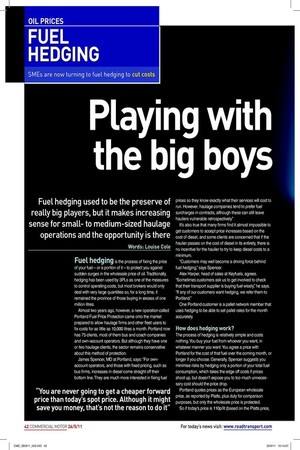Playing with the big boys
Page 33

Page 34

If you've noticed an error in this article please click here to report it so we can fix it.
Fuel hedging used to be the preserve of really big players, but it makes increasing sense for smallto medium-sized haulage operations and the opportunity is there
Words: Louise Cole Fuel hedging is the process of fixing the price of your fuel – or a portion of it – to protect you against sudden surges in the wholesale price of oil. Traditionally, hedging has been used by 3PLs as one of the measures to control operating costs, but most brokers would only deal with very large quantities so, for a long time, it remained the province of those buying in excess of one million litres.
Almost two years ago, however, a new operation called Portland Fuel Price Protection came onto the market prepared to allow haulage firms and other fleet users to fix costs for as little as 10,000 litres a month. Portland now has 75 clients, most of them bus and coach companies and own-account operators. But although they have one or two haulage clients, the sector remains conservative about this method of protection.
James Spencer, MD at Portland, says: “For ownaccount operators, and those with fixed pricing, such as bus firms, increases in diesel come straight off their bottom line. They are much more interested in fixing fuel prices so they know exactly what their services will cost to run. However, haulage companies tend to prefer fuel surcharges in contracts, although these can still leave hauliers vulnerable retrospectively.” It’s also true that many firms find it almost impossible to get customers to accept price increases based on the cost of diesel, and some clients are concerned that if the haulier passes on the cost of diesel in its entirety, there is no incentive for the haulier to try to keep diesel costs to a minimum.
“Customers may well become a driving force behind fuel hedging,” says Spencer.
Alex Harper, head of sales at Keyfuels, agrees. “Sometimes customers ask us to get involved to check that their transport supplier is buying fuel wisely,” he says. “If any of our customers want hedging, we refer them to Portland.” One Portland customer is a pallet network member that uses hedging to be able to set pallet rates for the month accurately.
How does hedging work?
The process of hedging is relatively simple and costs nothing. You buy your fuel from whoever you want, in whatever manner you want. You agree a price with Portland for the cost of that fuel over the coming month, or longer if you choose. Generally, Spencer suggests you minimise risks by hedging only a portion of your total fuel consumption, which takes the edge off costs if prices shoot up, but doesn’t expose you to too much unnecessary cost should the price drop.
Portland quotes prices as the European wholesale price, as reported by Platts, plus duty for comparison purposes, but only the wholesale price is protected.
So if today’s price is 110p/lit (based on the Platts price, plus duty, ex-VAT) and you believe the price is likely to climb, you can fix a price with Portland for 110p/litre for, say, 30,000 litres. You then know with certainty how much you will end up paying for that portion of fuel.
If the price drops to 108p/lit, you will pay the 2p/lit on the 30,000 litres to Portland. However, if the price rises, Portland will reimburse you the cost over 110p/lit, again multiplied by 30,000 litres. So, either way, your price has been fixed.
Portland doesn’t charge a fee because it will have underwritten the deal with a trader for the same volume for 109.5p/lit. If the price goes up to 111p, Portland will pay you the extra 1p/lit, but its trader will reimburse it 1.5p/lit. Either way you get your fixed cost, and Portland makes a margin.
Keep your feet on the ground
Spencer says companies must be realistic about their expectations: “You are never going to get a cheaper forward price than today’s spot price. And although hedging may save you money, that isn’t the reason to do it. It’s about allowing you to control operating costs.” Portland encourages operators to trial the product first with a small amount of fuel, although Spencer emphasises that it is very simple. Once a month, Portland sends a settlement based on Platts prices; Portland does not need to know any details of your fuel purchasing, nor see any paperwork.
“It’s much simpler than people think,” says Spencer. “And how can it make any sense in the current climate to have no protection against fuel price rises?” Harper says: “Far too few hauliers understand the impact that fuel buying choices can make.” He says the savvy companies use a mixture of buying techniques. “Some take a fixed margin contract, some hedge, and some keep the rest on the spot market so they spread their risk.” Wincanton uses hedging as one of many practices in its fuel procurement strategy. A spokesperson says: “We are always looking at ways to control and reduce costs for our customers, and fuel is clearly a significant cost factor.
“Our customers will have different fuel requirements, such as security and stability of supply, flexibility of delivery arrangements and cost. We therefore need to offer a range of different fuel risk management strategies, which will include fuel hedging, fixed price or market tracking supply arrangements, and direct supply of fuel to preferred sub-contract hauliers. These all help to ensure Wincanton controls the quality, availability and cost of fuel to the customer, as well as optimise fuel supply terms.” ■












































